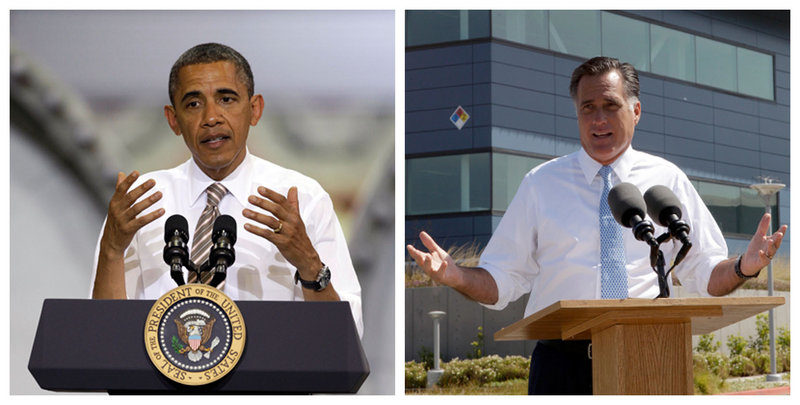ELK GROVE VILLAGE, Ill. — Mitt Romney sought to inject the issue of welfare into the presidential campaign here Tuesday, accusing President Obama of dismantling federal welfare reform and creating a “culture of dependency.”
The presumptive Republican nominee charged that the Obama administration has reversed the popular bipartisan welfare reform that President Clinton signed into law in 1996 by allowing waivers for states for welfare work requirements.
“That is wrong. If I’m president, I’ll put work back in welfare,” said Romney, who was campaigning in this suburb just outside Obama’s hometown of Chicago.
He added, “We will end the culture of dependency and restore a culture of good, hard work.”
Romney’s comments come as his campaign makes a play for middle-class voters with a new offensive focused on welfare. Earlier Tuesday, his team rolled out a new 30-second television advertisement, “Right Choice,” that says, “Obama guts welfare reform.”
DRIVING LEGACY WEDGE
The spot is Romney’s latest attempt to cast Obama as a big-government liberal and to drive a wedge between the president and the legacy of the popular Clinton. Experts on the law, however, said the changes were consistent with calls from governors for lighter federal regulations and intended to ease the burden of states seeking flexibility.
The Department of Health and Human Services announced July 12 that it would consider requests for waivers from states seeking more latitude in administering Temporary Assistance for Needy Families.
The centerpiece of the 1996 Clinton legislation, TANF established work requirements and time-limited benefits for recipients. Although caseloads dropped sharply as the economy boomed in the late 1990s, state officials and welfare experts say tougher financial times and overly stringent rules have stalled progress.
Lanhee Chen, the Romney campaign’s policy director, said in a memo Tuesday that the rules changes were a sign that “not everyone was enthusiastic about welfare reform.”
“For instance, a man named Barack Obama took to the floor of the Illinois State Senate to announce his opposition. A devoted believer in old-school, big-government liberalism, Mr. Obama had no interest in embracing the welfare reform package,” Chen wrote. “Now as president, with an economy struggling, an election looming, and a dispirited liberal base in need of encouragement, he has decided to turn back the clock.”
OBAMA CAMP PUSHES BACK
Obama campaign officials pushed back hard. In a conference call with reporters, Stephanie Cutter, deputy campaign manager, blasted the ad as “hypocritical and false.”
She said the administration agreed to allow states to apply for waivers after hearing from governors, including Republicans Gary Herbert of Utah and Brian Sandoval of Nevada, who sought relief from cumbersome federal requirements and paperwork. To secure a waiver, however, states must show that their welfare programs will increase job placements by 20 percent, Cutter said.
“No plan that undercuts the goal of moving people from welfare to work will be approved, and it will not be approved if it weakens or undercuts or avoids time limits,” she said.
Obama campaign officials also noted that as Massachusetts governor in 2005, Romney was one of 28 Republican governors who petitioned Congress for state welfare waivers that were more expansive than those he attacked Tuesday.
James Kvaal, the Obama campaign’s policy director, said Romney and the other governors signed a letter endorsing a proposal from Sen. Charles E. Grassley, R-Iowa, to drop time limits on welfare benefits for those unable to find jobs.
UNDER TOUGHER CONDITIONS
On the same conference call, John Podesta, who was Clinton’s chief of staff, said Obama was “trying to administer the (welfare) program in a tougher economic condition and trying to accomplish the goal of giving people the dignity of a job.”
He called Obama’s strategy “consistent with President Clinton’s theory of the case,” adding that he spoke with Clinton on Tuesday and the former president agreed.
The Department of Health and Human Services said the waiver proposal was a response to calls from states for more flexibility in how they put people back to work.
“We also heard concerns that some TANF rules stifle innovation and focus attention on paperwork rather than helping parents find jobs,” Acting Assistant Secretary George Sheldon said last month in a message to state officials. Waivers will be granted to states only for projects deemed likely to improve job prospects for TANF recipients, he said.
Send questions/comments to the editors.



Comments are no longer available on this story